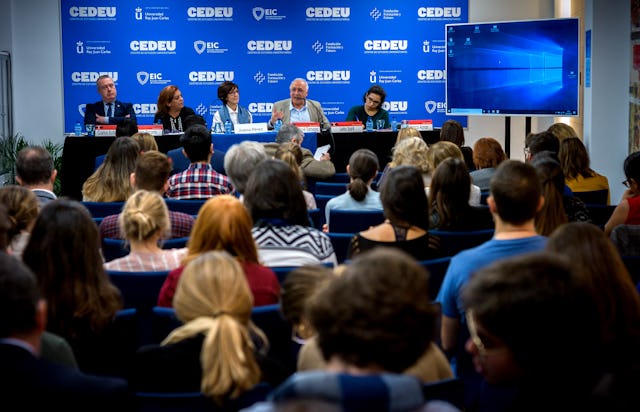Probing violent radicalization
MADRID — The rise of violent radicalization has sparked a sense of urgency in and across many societies. In Spain, where radicalization has become a growing concern, the Baha’i community has sought to contribute meaningfully to the prevalent thinking about this vexing issue.
In addition to approaches that seek to address radicalization at the level of policies, security measures, and technological interventions, there is a need for a deeper, evolving understanding of religion and its constructive role in society today. Representatives of Spain’s Baha’i community underscored this point in a recent high-level exploration of the causes of and responses to violent radicalization. At the core of faith, they argued, is the recognition of our profound oneness.
Co-organized by Spain's Baha’i community, a conference on 26 October brought together some 70 people—among them officials from Spain’s military and intelligence agencies, other government representatives, academics, journalists, and activists—in a dynamic exploration of this topical subject.
The discussions touched on concepts vital to responding to radicalization: the need for widespread consultative processes that build common understanding among the diverse segments of society; a due regard for the insights of both science and humanity’s great spiritual traditions; the delegitimization of violence as a response to oppression; the effective integration of newcomers; the liberating power of education; and the opportunity for all people to participate in the life of society.
“These are fundamental elements in efforts to overcome violent radicalization, especially when it is religiously motivated,” noted Sergio Garcia, the director of the Spanish Baha’i community’s Office of Public Affairs. Central to efforts to eradicate radicalization is an understanding of religion that allows for its constructive powers to be realized, he argued.
Spain’s Baha’i community has been participating in a growing discourse on the role of religion in society, in which radicalization has been an important topic. The daylong seminar at the Center of University Studies associated with the King Juan Carlos University in Madrid was the first in a series aiming to advance understanding about the causes of and responses to religious radicalization.
In the seminar, speakers noted how radicalization is a gradual process that manifests both in a person’s thoughts and actions. Religion has often been misused as a powerful force for directing motivation toward destructive ends, speakers noted.
“In exploring the connection between religion and violent radicalization, it is important to look honestly and objectively at the way religion has been manipulated to give impetus to this phenomenon,” said Leila Sant from the Baha’i Office of Public Affairs in Spain. Ms. Sant highlighted the need for a more robust conversation about religion.
“Despite the abuse of religion today and throughout history, there is no other phenomenon that reaches into such depths of motivation and inspires human beings to dedicate themselves to a higher cause,” said Dr. Garcia. “It is ultimately the power latent in religion that can transform anger and hatred into love and respect for the inherent dignity of others. The Baha’i writings teach that religion has an essential role in overcoming religious fanaticism, which is described as ‘a world-devouring fire.’”
“Once the religious dimension of radicalization is understood,” explained Dr. Garcia, “then it can be addressed from other social, political, and economic angles such as identity, strategy, political aims, and nationality.”
According to Ms. Sant, the event was a success not only because of the rich ideas that were shared. “This was not a space where people came, gave speeches, and then left. It was a space where a dialogue unfolded and everyone’s understanding advanced together.”

